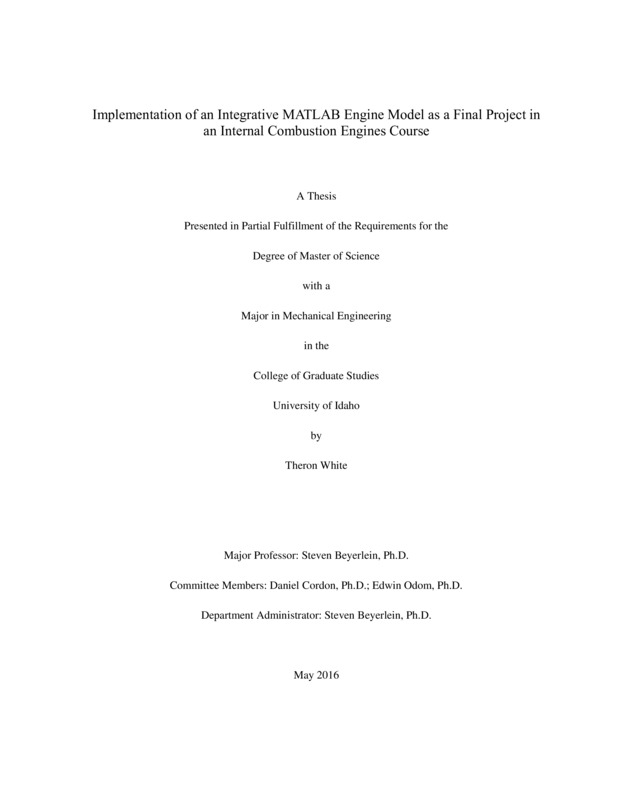Implementation of an Integrative MATLAB Engine Model as a Final Project in an Internal Combustion Engines Course
White, Theron Oscar. (2016). Implementation of an Integrative MATLAB Engine Model as a Final Project in an Internal Combustion Engines Course. Theses and Dissertations Collection, University of Idaho Library Digital Collections. https://www.lib.uidaho.edu/digital/etd/items/white_idaho_0089n_10930.html
- Title:
- Implementation of an Integrative MATLAB Engine Model as a Final Project in an Internal Combustion Engines Course
- Author:
- White, Theron Oscar
- Date:
- 2016
- Program:
- Mechanical Engineering
- Subject Category:
- Automotive engineering
- Abstract:
-
Abstract
There is insufficient time within a single technical elective to learn principles of internal combustion engine operation as well as specialized simulation tools such as GT Suite or Kiva. A number of authors have recognized this constraint, and they have structured their internal combustion engine text around use of programming languages such as FORTRAN, C++, and MATLAB®. This paper reports on how the capabilities of MATLAB® have been synergized with learning activities and homework assignments to set the stage for a successful final engine simulation project. The MATLAB® code involved in this effort can accept basic input parameters such as bore, stroke, compression ratio, spark advance, throttle position, RPM, air/fuel equivalence ratio, and volumetric efficiency and output power and torque using the Wiebe function and bulk temperature. In addition to power and torque predictions, the model described here uses a two-zone heat release model to predict brake specific fuel consumption as well as volumetric emissions. An engine-specific volumetric efficiency map is suggested to ensure accurate results at all throttle positions. Students are pleasantly surprised at how well their customized MATLAB® model is able to match published performance data from a diversity of applications: mopeds, racing motorcycles, sedans, and SUVs. The model has been used successfully by students for simulating engine results from 50 cm3 to 5 liters. These simulations produced power and torque results very close to the actual outputs of the engine based on factory engine data. These simulations also yield brake specific fuel consumption and brake specific emissions maps that agree with empirical data. A positive impact on professional skill development is demonstrated through a series of course surveys.
- Description:
- masters, M.S., Mechanical Engineering -- University of Idaho - College of Graduate Studies, 2016
- Major Professor:
- Beyerlein, Steven W
- Committee:
- Cordon, Dan; Odom, Edwin
- Defense Date:
- 2016
- Identifier:
- White_idaho_0089N_10930
- Type:
- Text
- Format Original:
- Format:
- application/pdf
- Rights:
- In Copyright - Educational Use Permitted. For more information, please contact University of Idaho Library Special Collections and Archives Department at libspec@uidaho.edu.
- Standardized Rights:
- http://rightsstatements.org/vocab/InC-EDU/1.0/

